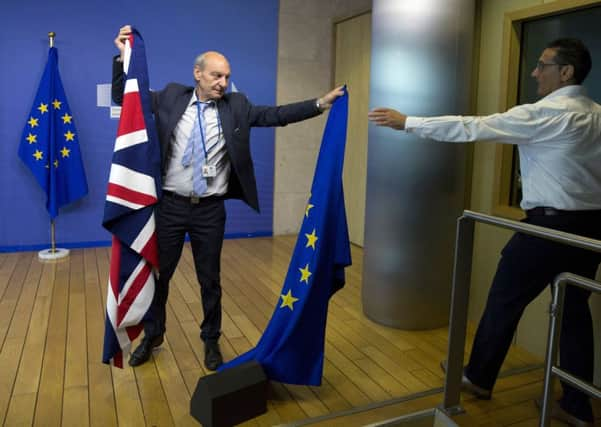Dominic Hinde: Vague Brexit approach means UK is in for '˜wild two years'


When I was in my first year of university, I wrote a terrible essay on the advantages of leaving the EU.
Going through the feedback on the exam script was sobering, and put an end to the delusions about my own genius I’d carried over from school.
Advertisement
Hide AdAdvertisement
Hide AdAs the lecturer pointed out, I had written a barely coherent 2000 words based on some vague ideas about Norway. If I had carried on in the same vein I’d have failed my degree, and it would have been entirely my own fault.
Fast-forward a decade and UK politics looks like my teenage hubris writ large.
Competing voices in the Conservatives are expressing support for hard, soft, open and ‘wet’ Brexits.
All of these are essentially meaningless, because none of them have outlined how these relate to specific parts of the Treaty on European Union, the central agreement the UK has decided to withdraw from.
Everyone knows the UK is seceding from the treaty, but nobody knows which parts it wants to replicate, and how it views its relationship to the associated Treaty on the Functioning of the European Union which outlines the details of everything from the free movement of goods to the European Investment Bank and structural funds.
Any kind of soft Brexit will mean finding a special place for Britain in the second treaty instead of relegating it to a place as merely another part of EU external policy.
The European negotiating team had hoped that Britain might give it some idea of what it wanted from Brexit, but as negotiations start in Brussels today, nobody on the European side seems sure what Britain actually sees as its destination.
The fallacy that appears to exist at the top levels of British government that specific deals can be done on a sector by sector basis is a dangerous one.
Advertisement
Hide AdAdvertisement
Hide AdThe EU treaties forbid member states from negotiating individual trading agreements, so the idea that German cars (many of which are manufactured outside Germany in other EU states) being sold in the Home Counties would somehow mean a good deal for the UK is a non-starter.
The second point of the Brexit manifesto – that the UK can forge trade agreements with developing economies – is also difficult to stand up.
The EU already has free trade agreements with Mexico, Chile, South Africa, South Korea, and Singapore, and is negotiating or near implementation with Canada, India and Brazil, as well as a host of developing African states.
The UK will exit the European union with potentially worse trading conditions than ever before, losing access not merely to EU markets but a host of others.
If the UK agrees to continue cooperating with EU external trade policy as a matter of necessity to keep these markets open then it will also bind itself to the EU more generally, but without having any power within the European Commission or European Parliament.
Another major risk is that the UK share of the EU’s overall economic heft is footloose; something the EU knows.
If financial services disappear to Frankfurt or Paris, Britain does not have a resource-based economy to fall back on.
Advertisement
Hide AdAdvertisement
Hide AdIt is also neither food nor energy independent, and needs to avoid tariffs on importing both.
What Britain does have is fish, and all the fishing towns who voted to leave the EU may find out that access to UK waters is very much on the table when London has such a poor hand and lack of direction.
If Britain fails to agree a deal and really does fall out of the EU without reaching consensus, then there is no knowing what will happen.
Food prices could soar, the pound could plummet, and the UK tax base could shrink to the point that public services already under huge strain would fall apart.
Britain’s economy is so entangled with the EU that cutting it off more or less overnight would be nothing short of a catastrophe.
Hold onto your hats, because the next two years are going to be wild.
• Dominic Hinde is a European correspondent and visiting researcher at the University of Edinburgh.